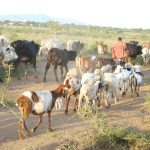May 14, 2024 (NAIROBI, Kenya) ICPALD funded by the government of Sweden, Ethiopia Embassy – under the Sustainable Ecosystem Management (SEM) project, held a two-day regional meeting on gender inclusive regional drylands forum to identify research priorities for co-creation.
The two days’ meeting held in Nairobi on May 13-14, 2024 was officially opened by Dr. Maurice Ouma, Deputy Director of Livestock Production on behalf of the Director of Livestock Production, Kenya. Welcome remarks were made by Dr. Dereje Wakjira, ICPALD Director. In his remarks, Dr. Dereje posed the question “What is the future thinking in sustaining livelihood in the drylands?”
Both speakers noted that rangelands dominate the arid and semi-arid lands (ASALs) of IGAD Member States where pastoralism and agro-pastoralism are the main livelihoods dependent on natural rangelands. However, rangelands are facing a myriad of challenges and change dynamics that threaten productivity, livestock forage availability and ecosystem integrity.
The challenges include climatic stresses; inadequate legal, institutional and organizational frameworks; degradation and land fragmentation; and unregulated land use and access to rangeland resources. Diminishing productivity and access to rangeland resources undermines rangeland health, and as a result, undermines the livelihood sustainability of pastoral and agropastoral communities.
In addition, control of access and management of rangeland resources by traditional institutions has been weakened over time, with an overall breakdown in governance leading to an ‘open access’ scenario due to the lack of mechanisms to regulate resource use. Thus, strengthening research can help sustainably exploit the rangelands for improved livelihoods for pastoral and agro-pastoral communities.
In attendance were twenty-five participants drawn from academia, researchers (ICRAF, NARO, KALRO and ESIPPS International Limited), and Ministry of Livestock representatives from Ethiopia, Kenya, South Sudan and Uganda. Ten participants attended virtually from Soroti University Uganda, Assosa University Ethiopia and ESIPPS.
Key highlights for future co-creation research initiatives discussed included:
- Having a commercial angle in research work which captures market dynamics of dryland products can promote uptake of result findings, contributing to sustained livelihoods
- Including gender empowerment indicators which will better demonstrate gender inclusivity
Specific priority research areas with potential for co-creation in the different geographic regions i.e. Kapoeta East-South Sudan, Kaabong District-Uganda, Benishangul- Gumuz Region-Ethiopia, were agreed on during the break out sessions.
###






